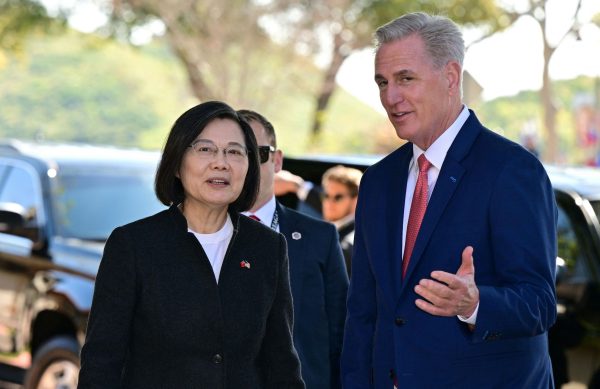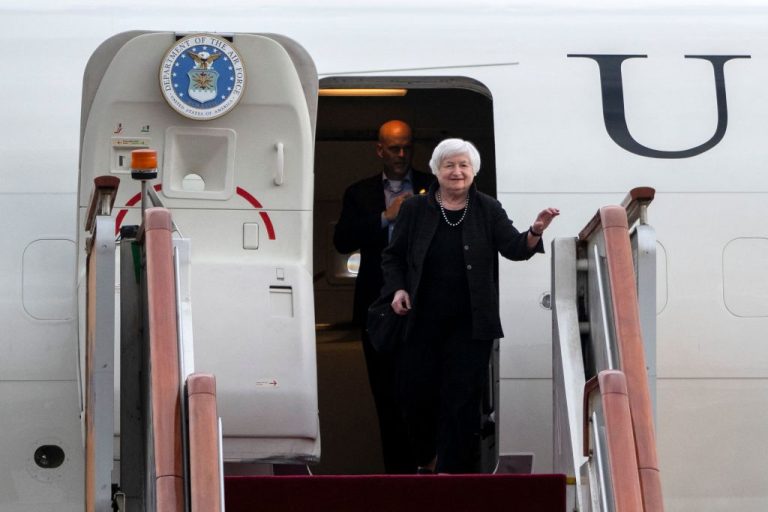On July 6, U.S. Treasury Secretary, Janet Yellen, embarked on a four-day diplomatic journey to Beijing. The trip — representative of an evolving detente — is targeted at fostering understanding and cooperation amidst the mounting competitive tension between the U.S. and China.
The visit by Yellen comes in the wake of U.S. Secretary of State Antony Blinken’s Beijing trip, which transpired a few weeks ago. Blinken’s meeting marked the initial high-level diplomatic interaction between the two nations, following a prolonged period of strained relations.
MORE ON US-CHINA TENSIONS AND ECONOMIC CLASHES:
- China Hiding $3 Trillion in Foreign Currency ‘Shadow Reserves’, Former US Official Says
- China’s Export Controls on Gallium and Germanium Escalate Semiconductor Trade War
- US Lawmakers Demand Greater Transparency Over Alleged Chinese Spy Facility in Cuba
- High-ranking CCP Official in Guangdong, Li Chunsheng, Sacked for Corruption
Andrew Sheng, an esteemed fellow at the University of Hong Kong’s Asia Global Institute, shared his perspective with CNBC on July 6, stating, “The two sides are basically talking, trying to find the strategic space for both sides to operate, and this will be very good for the rest of the world.”
RELATED: Antony Blinken Meets With Xi Jinping Amidst High Sino-US Tensions
Yellen’s agenda in Beijing
The timing of Yellen’s journey coincides with China’s sudden decision to implement export restrictions on chipmaking metals and their compounds. This move elevates the ongoing technological discord between Beijing and the West, specifically in the U.S. and Europe, said Sheng.
Success
You are now signed up for our newsletter
Success
Check your email to complete sign up
Prior to setting off for China, Yellen engaged in what was described as a “frank and productive discussion” with Xie Feng, the Chinese U.S. ambassador. The U.S. Treasury confirmed this interaction, and said Yellen’s trip is aimed at “deepening communication” between the world’s top economic powers.
The Treasury Department elaborated on Yellen’s agenda in Beijing in a statement issued on July 2, stating: “While in Beijing, Secretary Yellen will discuss with [People’s Republic of China] officials the importance for our countries — as the world’s two largest economies — to responsibly manage our relationship, communicate directly about areas of concern, and work together to address global challenges.”
Economic objectives
In a speech given in April, Yellen underscored the need for equitable competition between the U.S. and China. She highlighted three primary economic objectives for their relationship: safeguarding national security interests and human rights, stimulating mutually beneficial growth, and cooperating on global issues such as climate change and debt distress.
Yellen also wrote on her Twitter account prior to the trip that the U.S. is “seeking a healthy economic competition that benefits American workers and firms and to collaborate on global challenges,” she wrote, adding, “We will take action to protect our national security when needed, and this trip presents an opportunity to communicate and avoid miscommunication or misunderstanding.”
A high-ranking official in the administration also relayed on July 2 that Yellen’s visit will emphasize these objectives, stating, “We do not seek to decouple our economies. A full cessation of trade and investment would be destabilizing for both of our countries and the global economy.”
On the Taiwan issue
In recent years, the Chinese Communist Party (CCP) has also intensified its intimidation tactics against the island nation of Taiwan by employing increasingly aggressive military and diplomatic threats. The CCP’s actions are aimed to undermine Taiwan’s sovereignty, isolate it diplomatically, and restrict its international recognition.
READ MORE: US Senators Visit Taiwan, Prompting Major PLA Military Drills Near Island
The U.S., on the other hand, has maintained a delicate balance regarding Taiwan, with Secretary of State Antony Blinken saying Washington would ensure “Taiwan has adequate means to defend itself” in the event of an attack by communist China.
Washington has also continued to hold informal diplomatic ties with Taiwan, and provided military, tactical, and political support to Taiwanese troops as part of the Taiwan Relations Act (TRA) passed in 1979. The TRA requires the U.S. to provide Taiwan with necessary weapons and military training in the event of an invasion or military coercion against the island.

In August, 2022, following a visit to Taipei by then-U.S. House Speaker Nancy Pelosi, tensions reached a boiling point, with Beijing issuing multiple warnings and lodging formal complaints against what they believed to be a “vicious and provocative” move that would result in the serious “interfering of China’s internal affairs.”
The CCP claims Taiwan as a rightful part of its territory and has vowed to retake the island by any means necessary, even if that means a military invasion. Since Beijing does not recognize an independent Taiwan, it insists that any country wishing to pursue diplomatic relations with it must first break official ties with Taipei under its One-China principle.
Formally known as the Republic of China (ROC), Taiwan once governed all of China before being forced off the mainland by communist rebels, who founded the People’s Republic in 1949.


















